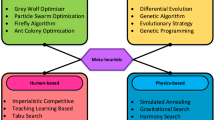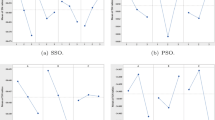Abstract
In this research study, a single machine batch-processing problem with release dates to minimize the total completion times of jobs is considered. The machine is able to process at most a certain number of jobs at the same time and the total size of the jobs allocated to a batch cannot exceed the machine capacity. Since the research problem has been shown to be NP-hard, an effective Teaching–Learning Based Optimization (TLBO) is proposed. A constructive heuristic approach is developed to generate initial feasible solutions for the TLBO. In order to enhance the efficiency of the proposed TLBO, a Tabu Search (TS) with three different neighborhood generation mechanisms is incorporated into the teaching phase and learner phase separately. To validate the outcomes of the proposed TLBO, we carry out an experimental study and compare its outcomes with the best-known results obtained by several meta-heuristic methods on a set of benchmark instances derived from the literature. The computational results show that the proposed TLBO with the incorporation of TS in its learning phase is able to come up with very good quality solutions.



Similar content being viewed by others
References
Uzsoy R (1994) Scheduling a single batch processing machine with non-identical job sizes. Int J Prod Res 32(7):1615–1635
Lee C-Y, Uzsoy R (1999) Minimizing makespan on a single batch processing machine with dynamic job arrivals. Int J Prod Res 37(1):219–236
Baker R, Trietsch D (2009) Principles of sequencing and scheduling. Wiley, New Jersey
Jolai Ghazvini F, Dupont L (1998) Minimizing mean flow times criteria on a single batch processing machine with non-identical jobs sizes. Int J Prod Econ 55(3):273–280
Beldar P, Costa A (2018). Single machine batch processing problem with release dates to minimize total completion time. Int J Ind Eng Comput 9(3), 331–348. Retrieved from https://www.researchgate.net/publication/329982505_Data_and_Resultsrar
Brucker P (2007) Scheduling algorithms. Springer, New York
Chandru V, Lee C-Y, Uzsoy R (1993) Minimizing total completion time on batch processing machines. Int J Prod Res 31(9):2097–2121
Uzsoy R, Yang Y (1997) Minimizing total weighted completion time on a single batch processing machine. Prod Oper Manag 6(1):57–73
Liu Z, Yu W (2000) Scheduling one batch processor subject to job release dates. Discrete Aplp Math 105(1–3):129–136
Dupont L, Dhaenens-Flipo C (2002) Minimizing the makespan on a batch machine with non-identical job sizes: an exact procedure. Comput Oper Res 29(7):807–819
Chang P-C, Wang H-M (2004) A heuristic for a batch processing machine scheduled to minimise total completion time with non-identical job sizes. Int J Adv Manuf Technol 24(7–8):615–620
Melouk S, Damodaran P, Chang P-Y (2004) Minimizing makespan for single machine batch processing with non-identical job sizes using simulated annealing. Int J Prod Econ 87(2):141–147
Damodaran P, Kumar Manjeshwar P, Srihari K (2006) Minimizing makespan on a batch-processing machine with non-identical job sizes using genetic algorithms. Int J Prod Econ 103(2):882–891
Damodaran P, Srihari K, Lam S (2007) Scheduling a capacitated batch-processing machine to minimize makespan. Robot Comput Integr Manuf 23(2):208–216
Rafiee Parsa N, Karimi B, Husseinzadeh Kashan A (2010) A branch and price algorithm to minimize makespan on a single batch processing machine with non-identical job sizes. Comput Oper Res 37(10):1720–1730
Xu R, Chen H, Li X (2012) Makespan minimization on single batch-processing machine via ant colony optimization. Comput Oper Res 39(3):582–593
Lee Y, Lee Y (2013) Minimising makespan heuristics for scheduling a single batch machine processing machine with non-identical job sizes. Int J Prod Res 51(12):3488–3500
Jia Z-H, Leung J-T (2014) An improved meta-heuristic for makespan minimization of a single batch machine with non-identical job sizes. Comput Oper Res 46:49–58
Zhou S, Chen H, Xu R, Li X (2014) Minimising makespan on a single batch processing machine with dynamic job arrivals and non-identical job sizes. Int J Prod Res 52(8):2258–2274
Al-Salamah M (2015) Constrained binary artificial bee colony to minimize the makespan for single machine batch processing with non-identical job sizes. Appl Soft Comput 29:379–385
Rafiee Parsa N, Karimi B, Moattar Husseini S (2016) Minimizing total flow time on a batch processing machine using a hybrid max–min ant system. Comput Ind Eng 99:372–381
Chung T-P, Sun H (2017) Scheduling batch processing machine problem with non-identical job sizes via artificial immune system. J Ind Prod Eng 35(3):129–134
El-Ghazali T (2009) Metaheuristics: from design to implementation. Wiley, New Jersey
Keesari H, Rao R (2014) Optimization of job shop scheduling problems using teaching-learning-based optimization algorithm. OPSEARCH 51(4):545–561
Xu Y, Wang L, Wang S-Y, Liu M (2015) An effective teaching–learning-based optimization algorithm for the flexible job-shop scheduling problem with fuzzy processing time. Neurocomputing 148:260–268
Shao W, Pi D, Shao Z (2017) An extended teaching-learning based optimization algorithm for solving no-wait flow shop scheduling problem. Appl Soft Comput 61:193–210
Rao R, Savsani V, Vakharia D (2011) Teaching–learning-based optimization: a novel method for constrained mechanical design optimization problems. Comput Aided Des 43(3):303–315
Rao R, Savsani V, Vakharia D (2012) Teaching–learning-based optimization: an optimization method for continuous non-linear large scale problems. Inf Sci 183(1):1–15
Zhang R, Song S, Wu C (2013) A hybrid differential evolution algorithm for job shop scheduling problems with expected total tardiness criterion. Appl Soft Comput 13(3):1448–1458
Gohari S, Salmasi N (2015) Flexible flowline scheduling problem with constraints for the beginning and terminating time of processing of jobs at stages. Int J Comput Integr Manuf 28(10):1092–1105
Zou F, Wang L, Hei X, Chen D, Yang D (2014) Teaching–learning-based optimization with dynamic group strategy for global optimization. Inf Sci 273:112–131
Xie Z, Zhang C, Shao X, Lin W, Zhu H (2014) An effective hybrid teaching–learning-based optimization algorithm for permutation flow shop scheduling problem. Adv Eng Softw 77:35–47
Qiuhua T, Zixiang L, LiPing Z, Chaoyong Z (2017) Balancing stochastic two-sided assembly line with multiple constraints using hybrid teaching-learning-based optimization algorithm. Comput Oper Res 82:102–113
Chen X, Xu B, Mei C, Ding Y, Li K (2018) Teaching–learning–based artificial bee colony for solar photovoltaic parameter estimation. Appl Energy 212:1578–1588
Costa A, Alfieri A, Matta A, Fichera S (2015) A parallel tabu search for solving the primal buffer allocation problem in serial production systems. Comput Oper Res 64:97–112
Mann H, Whitney D (1947) On a test of whether one of two random variables is stochastically larger than the other. Ann Math Stat 18(1):50–60
Author information
Authors and Affiliations
Corresponding author
Additional information
Publisher's Note
Springer Nature remains neutral with regard to jurisdictional claims in published maps and institutional affiliations.
Rights and permissions
About this article
Cite this article
Beldar, P., Framinan, J.M. & Ardakani, A. Minimization of total completion time on a batch processing machine with arbitrary release dates: an effectual teaching–learning based optimization approach. Prod. Eng. Res. Devel. 13, 557–566 (2019). https://doi.org/10.1007/s11740-019-00906-2
Received:
Accepted:
Published:
Issue Date:
DOI: https://doi.org/10.1007/s11740-019-00906-2




